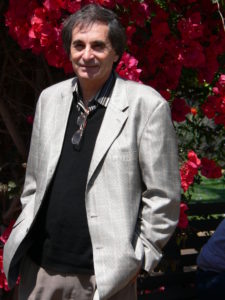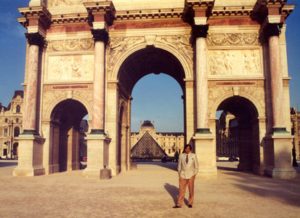Interview with John Teressi
GoodReads Interview with John Joseph Teressi
How do you deal with writer’s block?
A book is an expression of multiple energies, usually dominated by the characters and then by their environment and individual circumstances. When you have writer’s block, your emotion or Energy in Motion is damned up and unable to be used constructively. If that happens, you need to look again at your characters and examine what is happening in the storyline. A particular person may no longer be contributing to the flow of the story, and they need to be developed more fully, substituted or perhaps add a new character.
If you have a compelling story, the story should write itself, and you are just the taking notes.
If you don’t feel like writing, it is best to wait. Go and do something that inspires you or challenges you. Read a book that excites you. Do something to get the juices flowing so that you once again want to express what you see, feel, and hear in your mind and heart.
One idea is to pretend that you are writing a news release about the events in the story. Put down all the facts. Then become a detective and ask, what is the meaning behind the story? Why did it happen? That exercise might get you interested in detailing the events more thoroughly, writing more description of the scene, and describing what the characters are seeing and feeling.
It is essential to write a general outline of what you want to say and describe the action in as much detail as possible. Create strong characters. If they are not sharp and memorable, make them so or throw them out. If they are boring you, they will bore others. Try to envision scenes from your outline. Describe the location and how the characters interact with their environment and other people.
 What’s the best thing about being a writer?
What’s the best thing about being a writer?
As a writer, you are always observing, watching, and taking mental notes of people, places, and events. Paying attention makes you more aware of the world around you. Travel is the ultimate source of story material since you are viewing other locals, cultures, and patterns of being. As you gather a treasure trove of information, sensations, and experiences, your expertise as a writer helps you to express your sense of inventiveness and imagination to explore the human condition and create new worlds. I believe it is a writer’s mission to take it to extremes and then beyond that. Push beyond the boundaries, and you just might come up with something extraordinary and worthwhile to share.
What’s your advice for aspiring writers?
Always ask your characters questions. Why are they the way they are? If you ask a lot of questions, they will begin to speak to you.
Page through the dictionary at random and find words that are either new or inspiring to you. Make a list of those words and see how you might incorporate them into a short scene or dialogue. Without a vast compendium of words, you will not possess all the tools necessary to express the characters and events in your book dramatically.
Travel and experience as much as you can while taking detailed notes. Describe people, places, events, thoughts, feelings, and interactions. It is all these details that make up a compelling story to capture the reader’s attention.
What are you currently working on?
I am working on the sequel to “Portals in Time: The Quest for Un-Old-Age.” The Gripps return to Grippland, and their world has changed drastically. Can they adjust? Or should they fight back? Will the information they learned in “Portals in Time” help them to save their civilization?
How do you get inspired to write?
I identify with the energy of the project. I feel the momentum of the events in the story and work with the characters and plotline to create a dynamic, energetic flow to engage the reader emotionally and intellectually with suspense, humor and surprising conclusions.
I always carry a notebook with me and keep it by my bed. I write down ideas and possible scenes or dialogue when they come to mind. I allow the characters to talk to me and experience the story through their eyes.
Where did you get the idea for your most recent book?
The idea for “Portals in Time” came from my love of nature, my interest in philosophy and metaphysics, and a fascination with Time.
Growing up in Los Angeles, I noted that we as humans seem to think of ourselves as conquerors of the planet, ripping out trees and cementing over the ground, rather than loving and appreciating a natural environment. I believe that nature supports us in many ways, far beyond providing air to breathe, herbs to heal, and protection from the elements.
Experiencing the rhythm of nature allowed me to open my mind and heart to spiritual experiences that added so much to my life. At the same time, I realized that words form thoughts that lead to actions that create our reality. Thus, was born “Portals in Time.”